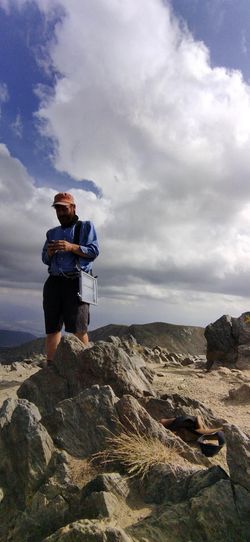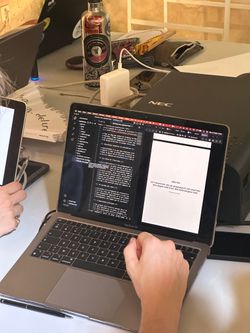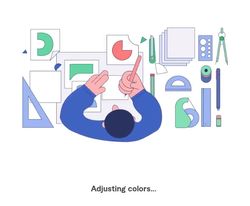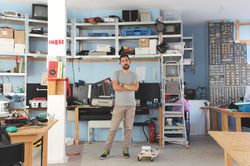TUE 21
back
Lectures
Opening Dsign Symposium Pt. 2
18:30–20:30
w/ Joseph Knierzinger & Simon Repp, Lucile Haute, Silvio Lorusso
@/
Kunstuniversität Linz, Audimax, 1.floor
Domgasse 1, 4020 Linz
18:00 – 18:20
«To change the rules, change the tools?»
— Joseph Knierzinger & Simon Repp

Joseph Knierzinger & Simon Repp


The title of this talk goes back to an aphorism by Lee Felsenstein, an advocate of Ivan Illich’s “Tools for Conviviality” and early pioneer of the homecomputer, however we allowed ourselves to add a questionmark. Why? Over the last decade, proprietary software used in art education shifted from lifelong licensing to a “Software-as-a-Service” model, forcing students, institutions and their alumnis to rent their tools, for ever increasing prices, on a monthly basis instead of actually ever owning (or cracking) them. Although this development was reflected in art/design education institutions and there are various alternative, counter-cultural DIY and FLOSS approaches, this reflection never lead to structural changes and the dependency on proprietary tools (actually products) was never broken. What went wrong and where do curent strategies to structurally address the problems fall short?
Joseph Knierzinger
Joseph Knierzinger is design/art prototyping teacher in Rotterdam and art/crafts edcuation student in Vienna. He regularly takes devices and tools apart to create anachronistic, fictitious timelines. He loves to take long hikes with a document scanner to capture the details of the world.
joak.nospace.at
Simon Repp
Developer and designer with a focus on ethics, simplicity and sustainability.
simonrepp.com
@freebliss@post.lurk.org
Using web tools for print graphic design
— Lucile Haute

18:25-18:45
Graphic designers are facing the hegemony of a commercial software suite. Alternative processes are developed, such as the use of web techniques (html and css languages) to produce from the browser a pdf file for printing. It’s named web-to-print or css print. On the one hand, the convergence of print and screen workflows is a major challenge for publishers joining an invisible revolution for the graphic design profession. On the other hand, artists, graphic designers and collectives find in the reappropriation of their graphic creation tools a political commitment participating in a technological emancipation and empowerment. They embrace the values of free and open-source software, defending an ethic and developing a singular aesthetic. With this in mind, over the past few years, practitioners and teachers at various institutions have integrated web-to-print practice into their graphic design courses. This presentation will cover some of these workshops.
Lucile Haute

Lucile Olympe Haute is an artist, researcher and educator. Her research brings together spirituality, technologies and politics — understood in the broader sense of a committed and eco-responsible «living together» that goes beyond anthropocentrism and includes kingdoms of plants, animals and fungi, even the communities of bacteria in our biotopes. She combined these issues within her essay the Cyberwitches Manifesto, bringing together witches from different backgrounds, politically committed (such as ecofeminism, queer/transfeminism, technological emancipation) and involved into empowerment processes. She studied and made digital, multisupport and hybrid art books, addressing their sustainability. She uses and teaches css-print technics. She is the founder of the Web To Print Collection <web.2print.org>. She is a lecturer in art & design at the University of Nîmes (FR) and an associate researcher at École des arts décoratifs Paris (FR).
lucilehaute.fr
What Design Can’t Do: On Semi-Automation and Cultural Professionalism
— Silvio Lorusso

18:50-19:20
Guilt, fear, loss, ambition. Our relationship with technology is not just an operational one, but it’s linked to a whole spectrum of sentiments: designers worry and get excited, they mourn the demise of a technique, and they celebrate the birth of new know-hows. The territory is murky and not without risks, such as that of deskilling, that is, the relative contraction and devaluation of specific skills. Here, the case of graphic design is emblematic: outside design circles, the graphic designer is considered a sort of technician who possesses a certain adroitness with desktop publishing applications. This perception determines the social value of the designer as a professional figure, and to some extent also their compensation. As happened with the service sector as a whole, some skills – some trades, even! – have been incorporated into general-purpose software.
Silvio Lorusso

Silvio Lorusso is a writer, artist and designer based in Lisbon, Portugal. In 2018, he published his first book entitled Entreprecariat. He is assistant professor and co-director of the Center for Other Worlds at the Lusófona University in Lisbon and a tutor at the Information Design department of Design Academy Eindhoven. Lorusso holds a Ph.D. in Design Sciences from the Iuav University of Venice.
silviolorusso.com (ph Juseph Knierzinger)
\00\00